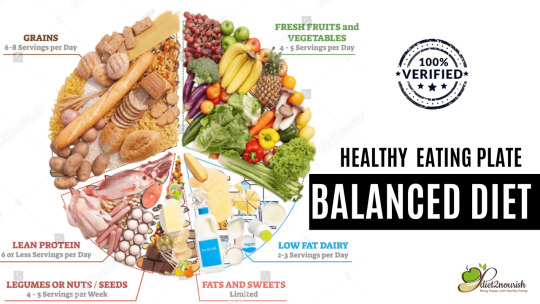balanced diet chart Guide to Eating Healthy on a Budget from diet2nourish's blog
A balanced diet is essential for maintaining good health and well-being. It provides the body with the necessary nutrients, vitamins, minerals, and energy needed for proper functioning. A well-balanced diet should include a variety of foods from all food groups in the right proportions.
Principles of a balanced diet chart
A balanced diet consists of foods that provide the following essential nutrients:
Carbohydrates: These are the body's primary source of energy. They are found in foods like grains, cereals, fruits, vegetables, and legumes. Complex carbohydrates, such as whole grains, are preferable as they provide sustained energy and fiber.
Proteins: Proteins are vital for growth, repair, and overall body function. Good sources of protein include lean meats, poultry, fish, dairy products, eggs, beans, and legumes.
Fats: Healthy fats are crucial for brain function and cell growth. Sources of healthy fats include avocados, nuts, seeds, olive oil, and fatty fish like salmon. Limit saturated and trans fats found in fried and processed foods.
Vitamins: A balanced diet should provide a variety of vitamins, including A, C, D, E, and K. These can be obtained from fruits, vegetables, dairy, and fortified foods.
Minerals: Essential minerals like calcium, magnesium, potassium, and iron are found in foods such as dairy products, leafy greens, nuts, and lean meats.
Fiber: Fiber aids digestion and helps maintain a healthy weight. It is found in whole grains, fruits, vegetables, and legumes.
Water: Staying hydrated is crucial for every bodily function. Drink plenty of water throughout the day, and include hydrating foods like fruits and vegetables in your diet.
Benefits of a balanced diet chart
A balanced diet offers numerous health benefits, including:
Weight Management: Eating a variety of nutrient-rich foods can help you maintain a healthy weight by controlling calorie intake.
Improved Digestion: High-fiber foods aid in digestion and prevent constipation.
Enhanced Energy Levels: A balanced diet provides the necessary energy for daily activities and exercise.
Better Mental Health: Proper nutrition is linked to improved mood and reduced risk of mental health disorders.
Stronger Immune System: A well-balanced diet supports a robust immune system, helping the body fight off illnesses.
Reduced Risk of Chronic Diseases: A diet rich in fruits, vegetables, whole grains, and lean proteins can reduce the risk of chronic diseases like heart disease, diabetes, and certain cancers.
Sample Balanced Diet Chart:
Here's a sample balanced diet chart to serve as a practical guide:
Breakfast:
- Option 1: Oatmeal topped with fresh berries, nuts, and a drizzle of honey. A glass of low-fat milk or a dairy-free alternative.
- Option 2: Whole-grain toast with avocado, poached eggs, and a side of spinach. A glass of orange juice.
Mid-Morning Snack:
- A piece of fruit, such as an apple or a banana.
- A handful of almonds or walnuts for added protein and healthy fats.
Lunch:
- Grilled chicken or tofu salad with mixed greens, cherry tomatoes, cucumbers, and a vinaigrette dressing.
- A serving of brown rice or quinoa.
- A glass of water or herbal tea.
Afternoon Snack:
- Greek yogurt with a sprinkle of granola and a drizzle of honey.
- Sliced carrots or celery with hummus.
Dinner:
- Baked salmon or a plant-based protein like lentils or chickpeas.
- Steamed broccoli or asparagus.
- A small serving of whole-wheat pasta with a tomato-based sauce.
- A side salad with a variety of colorful vegetables.
Evening Snack (if needed):
- A small bowl of mixed berries.
- A cup of herbal tea.
Important Considerations:
- Portion Control: Be mindful of portion sizes to avoid overeating.
- Hydration: Drink plenty of water throughout the day.
- Variety: Include a wide range of foods to ensure you get a diverse array of nutrients.
- Moderation: Limit foods high in added sugars, salt, and unhealthy fats.
Conclusion:
A balanced diet is the foundation of good health and well-being. It provides the body with the necessary nutrients to function optimally and reduces the risk of chronic diseases. By following the principles of a balanced diet and incorporating a variety of foods into your meals, you can enjoy the numerous health benefits that come with nourishing your body with the right nutrients. Remember that a balanced diet is a long-term commitment to a healthier, happier life.


The Wall